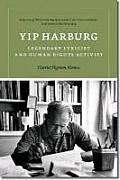“Yip” Harburg and the Wizard’s Speech
 I had long heard that E. Y. “Yip” Harburg was responsible for the Wizard’s oft-quoted speech as he gave out gifts to Dorothy’s three companions in MGM’s The Wizard of Oz. But I wasn’t sure what point he made his input. Was he hanging about the set during filming?
I had long heard that E. Y. “Yip” Harburg was responsible for the Wizard’s oft-quoted speech as he gave out gifts to Dorothy’s three companions in MGM’s The Wizard of Oz. But I wasn’t sure what point he made his input. Was he hanging about the set during filming?
According to Harriet Hyman Alonso’s biography Yip Harburg: Legendary Lyricist and Human Rights Activist, Harburg was involved fairly early. The studio already had some scripts when assistant producer Arthur Freed contacted Harburg and his musical partner, Harold Arlen, in New York. But according to Harburg’s memory, “Finally Arthur [Freed] agreed with my that we needed a new concept, to experiment, and let the lyrics and music wag the plot.”
What did that mean? Harburg continued:
So we put aside the six or seven existing scripts and started from scratch. We let the songs tell the story, and wrote the scenes around the songs, saving as much of the existing scripts as we were able to cue into the songs. . . .Scholars of musical comedies note that the Wizard doesn’t have any songs in the MGM movie. When it’s been adapted for the stage, as Andrew Lloyd Webber has just done, producers often cast a big (if aging) star as the Wizard and insert a number for him. But really the speech Harburg wrote functions like a good patter song.
Whatever weakness existed in the original story we replaced with new ideas. For example, my satiric sense rebelled when the Wizard gave the Tin Man a red pill for a heart and the Scarecrow a white pill for a brain. It was pat—and meaningless. My humorous spirit said, “Put a little bit into this. Why not show up some of the follies we live by?” When a guy goes to college, he doesn’t emerge with any more wisdom than when he went in. All he’s got is a diploma. So let’s be realistic: give the Scarecrow a diploma—and ipso facto, a brain.
In like manner, the do-gooders of the world never achieve hearts, but testimonials. Ergo, a watch for the Tin Man—that ticks like a heart. Plus an inscription for good deeds done. . . . I demonstrated all the parts to Louis B. Mayer and others with all the passion of my schoolboy experience. Thank you, P.S. 64!
The interview quoted above originally appeared in Bernard Rosenberg and Ernest Goldstein’s Creators and Disturbers: Reminiscences by Jewish Intellectuals of New York (1982), one of the many sources, published and unpublished, that Alonso drew on. In Max Wilk’s They’re Playing Our Song: Conversations with America’s Classic Songwriters, Harburg restated his approach:
I loved the idea of having the freedom to do lyrics that were not just songs but scenes. That was our own idea, to take some of the book and so some of the scenes in complete verse, such as the scenes in Munchkinland. It gave me wider scope.To Aljean Harmetz, author of The Making of “The Wizard of Oz”, he said: “The whole Munchkin sequence was done in prose. I threw it out and lyricized it. That was daring…the whole 10 minutes in rhyme. Never done before or since. All rhymed up.”
Harburg also took credit for suggesting Bert Lahr as the Cowardly Lion and even said things like, “I was torn between whether to have Haley as Scarecrow and Bolger as Tin Man because I thought Haley more of a weakie, more pathos. . . . I would have preferred Buddy Ebsen for either part to Haley or Bolger.”
In fact, Ebsen was cast as the Scarecrow until Bolger asked for a switch to accommodate his dance style, then as the Tin Man during early filming until he became dangerously ill from the makeup. Only then was Jack Haley brought in. So I’m not sure how much Harburg was really involved in casting, aside from perhaps tossing out ideas to producers Mervyn Leroy and Freed.


No comments:
Post a Comment